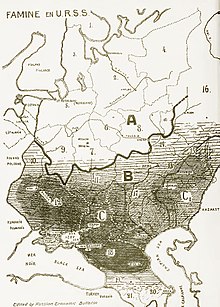1927–1931: Dekulakisation, collectivisation, and industrialisation
Economic policy
We have fallen behind the advanced countries by fifty to a hundred years. We must close that gap in ten years. Either we do this or we'll be crushed.
This is what our obligations before the workers and peasants of the USSR dictate to us.
— Stalin, February 1931[309]
The Soviet Union lagged behind the industrial development of Western countries,[310] and there had been a shortfall of grain; 1927 produced only 70% of grain produced in 1926.[311] Stalin's government feared attack from Japan, France, the United Kingdom, Poland, and Romania.[312] Many Communists, including in Komsomol, OGPU, and the Red Army, were eager to be rid of the NEP and its market-oriented approach;[313] they had concerns about those who profited from the policy: affluent peasants known as "kulaks" and small business owners or "Nepmen".[314] At this point, Stalin turned against the NEP, which put him on a course to the "left" even of Trotsky or Zinoviev.[315]
https://en.wikipedia.org/wiki/Joseph_Stalin
1932–1939: Major crises
Famine
| Part of a series on the |
| Holodomor |
|---|
|
|
|
|
|
|
Within the Soviet Union, there was widespread civic disgruntlement against Stalin's government.[377] Social unrest, previously restricted largely to the countryside, was increasingly evident in urban areas, prompting Stalin to ease on some of his economic policies in 1932.[378] In May 1932, he introduced a system of kolkhoz markets where peasants could trade their surplus produce.[379] At the same time, penal sanctions became more severe; at Stalin's instigation, in August 1932 a decree was introduced wherein the theft of even a handful of grain could be a capital offence.[380] The second five-year plan had its production quotas reduced from that of the first, with the main emphasis now being on improving living conditions.[378] It therefore emphasised the expansion of housing space and the production of consumer goods.[378] Like its predecessor, this plan was repeatedly amended to meet changing situations; there was for instance an increasing emphasis placed on armament production after Adolf Hitler became German chancellor in 1933.[381]
https://en.wikipedia.org/wiki/Joseph_Stalin

No comments:
Post a Comment